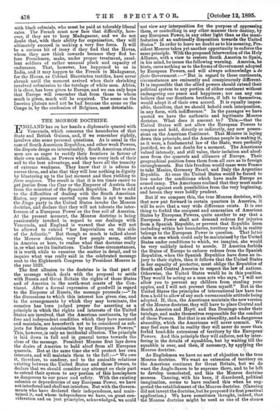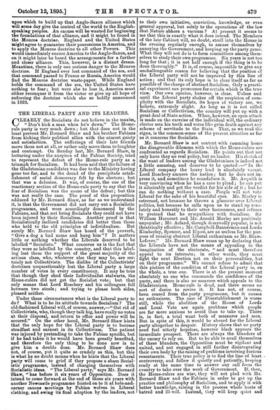THE MONROE DOCTRINE.
'ENGLAND has on her hands a diplomatic quarrel with Venezuela, which concerns the boundaries of that State and British Guiana, and, if we remember rightly, involves also some personal questions. As is usual in the case of South American Republics, and other weak Powers, the dispute drags on interminably. South American states- men are as eager to rectify their frontiers in favour of their own nation, as Powers which use every inch of their soil to the best advantage, and they have all the tenacity of extreme weakness. They know that it is odious to coerce them, and also that they will lose nothing in dignity by blustering up to the last moment and then yielding to force majeure. The result is that it is ten times easier to get justice from the Czar or the Emperor of Austria than from the minutest of the Spanish Republics. But to add to the difficulties of dealing with the South American States, any pressure exerted upon them is apt to make the Jingo party in the United States invoke the Monroe doctrine, and declare that they will not tolerate the inter- ference of a European Power on the free soil of America. At the present moment, the Monroe doctrine is being passionately invoked in regard to our dealings with Venezuela, and England is warned that she will not be allowed to extend " her Imperialism on this side of the Atlantic." But though so much is talked about the Monroe doctrine, very few people seem, either in America or here, to realise what that doctrine really is, or what are its limitations. Under these circumstances, it is worth while to examine the matter in detail, and to inquire what was really said in the celebrated message sent to the Eighteenth Congress by President Monroe in the year 1823.
The first allusion to the doctrine is in that part of the message which deals with the proposal to settle with Russia and Great Britain the rights of those States and of America in the north-west coasts of the Con- tinent. After a formal expression of goodwill in regard to the Emperor of Russia, the message proceeds :—" In the discussions to which this interest has given rise, and in the arrangements by which they may terminate, the occasion has been judged proper for asserting as a principle in which the rights and interests of the United States are involved, that the American continents, by the free and independent condition which they have assumed and maintain, are henceforth not to be considered as sub- jects for future colonisation by any European Powers." This, however, is only an incidental allusion. The principle is laid down in full and in general terms towards the close of the message. President Monroe first lays down the desire of America to hold aloof from all European quarrels. But at the same time she will protect her own interests, and will maintain them to the full :—" We owe it, therefore, to candour, and to the amicable relations existing between the United States and those Powers, to declare that we should consider any attempt on their part to extend their system to any portion of this hemisphere as dangerous to our peace and safety. With the existing colonies or dependencies of any European Power, we have not interfered and shall not interfere. But with the Govern- ments who have declared their independence, and main- tained it, and whose independence we have, on great con- sideration and on just principles, acknowledged, 're could not view any interposition for the purpose of oppressing them, or controlling in any other manner their destiny, by any European Power, in any other light than as the mani- festation of an unfriendly disposition towards the United States." In order to leave no doubt as to his meaning, Pre- sident Monroe takes yet another opportunity to enforce the same principle. With the proposed intervention of the Holy Alliance, with a view to restore South America to Spain, in his mind, he issues the following warning. America, he hints, cares nothing as to the forms of Government adopted by European Powers, and will always acknowledge a de facto Government :—" But in regard to these continents, circumstances are eminently and conspicuously different. It is impossible that the allied powers should extend their political system to any portion of either continent without endangering our peace and happiness; nor can any one believe that our Southern brethren, if left to themselves, would adopt it of their own accord. It is equally impos- sible, therefore, that we should behold such interposition, in any form, with indifference." In the passages we have quoted we have the authentic and legitimate Monroe doctrine. What does it amount to ? This,—that the United States will not allow the European Powers to conquer and hold, directly or indirectly, any new posses- sions on the American Continent. That Monroe in laying down this principle, and the American people in making it, as it were, a fundamental law of the State, were perfectly justified, we do not doubt for a moment. The Americans valued intensely, and still value, their isolation and aloof- ness from the quarrels and alliances of Europe. Their geographical position frees them from all care as to foreign entanglements. But this freedom would cease were France to take Mexico, Germany Brazil, and Italy the Argentine Republic. At once the United States would be forced to live under the conditions which have made Europe an armed camp. The Americans realised that they must make a stand against such possibilities from the very beginning, and herein they were boldly prudent.
But if we compare this, the true Monroe doctrine, with that now put forward in certain quarters in America, it will be seen that a very wide difference exists. It is one thing to forbid the conquest and annexation of American States by European Powers, quite another to say that a European Power shall not demand redress for injuries from a Spanish Republic, or prevent that Republic from including within her boundaries, territory which in reality belongs to the European Power in question. That latter claim is one which could only be maintained by the United States under conditions to which, we imagine, she would be very unlikely indeed to accede. If America forbids the States of Europe to enforce redress from the Spanish Republics, when the Spanish Republics have done an in- jury to their rights, then it follows that the United States in her capacity of protector, must oblige the Republics of South and Central America to respect the law of nations. Otherwise, the United States would be in this position. They would be acting as a man acts who says, " I will not allow you to prevent my children from stealing your apples, and I will not prevent them myself." But in the United States the principles of international law have too firm a hold to allow of any such unreasonable attitude being adopted. If, then, the Americans maintain the new version of the Monroe doctrine, they will have to place Central and South America and Hayti and San Domingo under their tutelage, and make themselves responsible for the conduct of those Powers. But that is an absurdity, and a dangerous absurdity, which the Americans will never commit. We may feel sure that in reality they will never do more than forbid bona-fide extensions of territory by the European Powers. And this principle they will enforce, not by inter- fering in the details of squabbles, but by waiting till the squabble is over, and then, if necessary, by applying the Monroe doctrine.
As Englishmen we have no sort of objection to the true Monroe doctrine. We want no extension of territory on the American continent for Great Britain, but we do want the Anglo-Saxon to be supreme there, and to be left to develop unmolested, and this the Monroe doctrine secures. Canning, with his keen, if disordered, political imagination, seems to have realised this when he sug- gested the establishment of the Monroe doctrine. (Canning did not invent the doctrine, but he proposed its first practical application.) We have sometimes thought, indeed, that the Monroe doctrine might be used as one of the stones upon which to build up that Anglo-Saxon alliance which will some day give the control of the world to the English- speaking peoples. An excuse will be wanted for beginning the foundations of that alliance, and it might be found in the Monroe doctrine. England and the United States might agree to guarantee their possessions in America, and to apply the Monroe doctrine to all other Powers. This would immediately ensure America to the Anglo-Saxon, and on it might later be based the arrangements for a further and closer alliance. This, however, is a distant dream. Meantime, there is only one serious danger to the Monroe doctrine. If England ever lost command of the sea, and that command passed to France or Russia, America would find the Monroe doctrine waste-paper. While England holds the command of the sea, the United States have nothing to fear ; but were she to lose it, America must either reconquer it from the victor or give up all hope of enforcing the doctrine which she so boldly announced in 1823.



















































 Previous page
Previous page